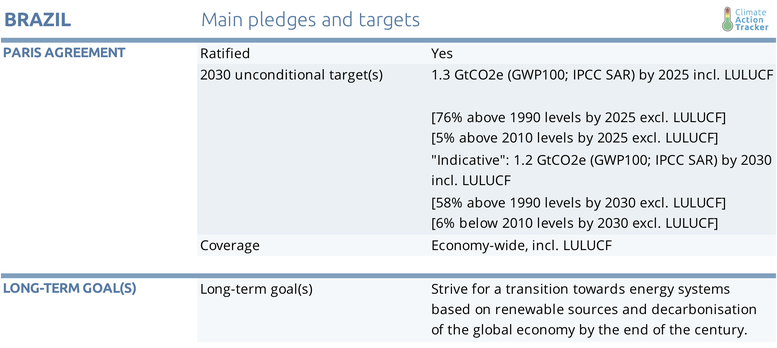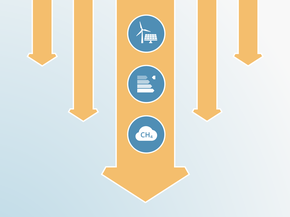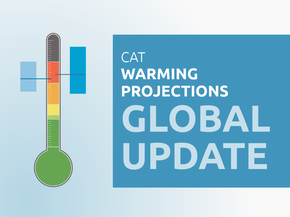Country summary
Overview
In just over 100 days in office, Brazil’s new President, Jair Bolsonaro, has moved his country further away from climate action and from fulfilling its commitments under the Paris Agreement. Despite backing off from his most extreme campaign positions on climate change, such as the intention to withdraw from the Paris Agreement, Bolsonaro and his cabinet have publicly expressed their opposition to many of Brazil’s existing climate policies.
The government has passed legislation that weakens the institutional and legal framework that helps fight deforestation and other environmental offenses, as well as reforms that substantially weaken the participation of civil society, including pro-environment groups, in policymaking and in oversight of policy implementation.
Brazil’s remarkable progress in forestry emissions mitigation observed since 2005 has stopped, and deforestation and resulting emissions increases have picked up speed again in recent years. The previous administration had already begun reverting key environmental policies in Brazil (budget cuts to the environmental authorities, and reversal of LULUCF policies already in place). Bolsonaro’s administration, supported by “ruralist” legislators who have traditionally opposed land preservation efforts and other anti-deforestation policies, has continued with the reversal of key environmental policies and weakening of environmental institutions.
The changes include eliminating 95% of the Ministry of Environment’s budget for climate change related activities; transferring the body responsible for certifying Indigenous territory from National Indian Foundation to the Ministry of Agriculture; easing the rules for converting environmental fines into alternative compensations; changes in the Forest code to extend deadlines for enforcement measures; and the abolition of most committees and commissions for civil participation and social control in the Federal Government.
The current situation is so critical that, for the first time in Brazilian history, a number of former Environment Ministers from different political parties have released a joint declaration encouraging civil society and the official institutions to pay close attention to the government’s detrimental decisions on the environment. This should raise concern.
While it’s hard to predict the effect these regulatory changes will have on emissions, most of them have the potential to drive up illegal deforestation and other environmental offenses. Given the key role of the Land Use and Forestry sector in Brazil’s NDC and the huge global importance of its forests for environmental services, biodiversity, and carbon sequestration, the Brazilian government urgently needs to strengthen mitigation action in this sector—instead of weakening it. Neither has the current administration implemented any new policies to halt emissions growth in other sectors. Bolsonaro’s agenda on environment is at odds with the urgent need for climate action in Brazil.


According to our most recent assessment, Brazil will need to implement additional policies to meet its NDC targets, and with current policies is expected to reach emissions levels (excluding LULUCF) of 1.079 MtCO2e in 2025 and 1.121 MtCO2e by 2030 (respectively, 27% and 32% above 2005 levels). Emissions in most sectors are expected to rise at least until 2030 and the current administration has not implemented any new policies to halt emissions growth.
The main policy instruments included in our current policy projections pathway are the energy efficiency national plans and the incentives for the uptake of renewables in the energy sector, including capacity auctions in the power sector, and the ethanol and biodiesel mandates in the transport sector, as well as the national biofuels policy RenovaBio. Brazil has enacted other sectoral plans to reduce emissions in other sectors of the economy, but was most of those policies and instruments are still not part of national development planning or regulation, we have not included in our current policy projections emissions pathway.
On forestry, in 2018, Brazil recorded the world’s highest loss of tropical primary rainforest of any country, reaching 1.3 million hectares, largely due to deforestation in the Amazon. National estimates show total deforestation reaching 7900 km2 in 2018, which is an increase of 13,7% from 2017 levels, and 72% from the historic low reached in 2012 (PRODES, 2019). National data shows a continuation in the increasing deforestation for the first few months of 2019. This trend takes Brazil in the opposite direction of its Paris Agreement commitments, which include a target of zero illegal deforestation in the Amazonia by 2030.
On energy, under current policy projections, the indicative NDC target of a 45% share of renewables in the total energy mix by 2030 will be achieved, with renewable energy expected to represent 47% of the energy mix in 2027. However, unless additional policies are put in place, emissions in the energy sector will continue to rise, leaving the huge national potential for renewable power generation untapped.
On transport, while biofuels have contributed significantly to improve the emissions intensity of the road transport sector in Brazil, full decarbonisation of the transport sector will require a fast uptake of electric vehicles (EVs). In terms of EVs, Brazil is a laggard, with a very small penetration rate and without a clear strategy to substantially increase the adoption of this technology.
To peak emissions and rapidly decrease levels afterward as required by the Paris Agreement, Brazil will need to reverse the current trend of weakening climate policy, by sustaining and strengthening policy implementation in the forestry sector and accelerating mitigation action in other sectors— including a reversal of present plans to expand fossil fuel energy sources.
Further analysis
Latest publications
Stay informed
Subscribe to our newsletter




